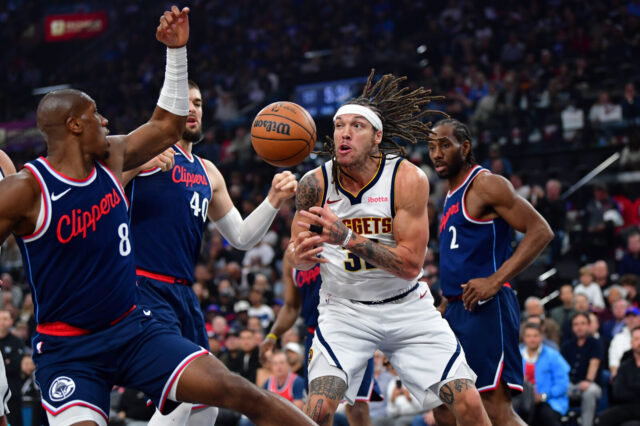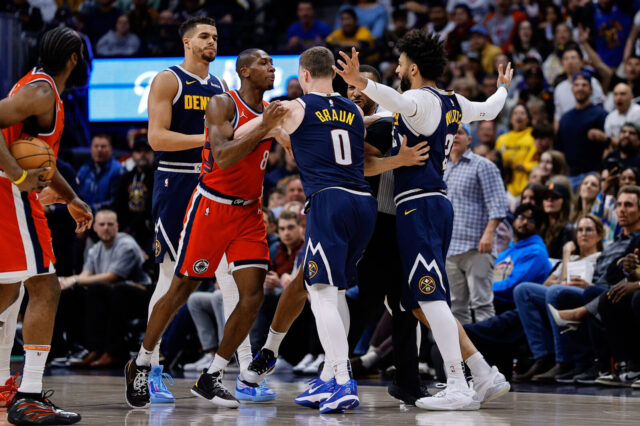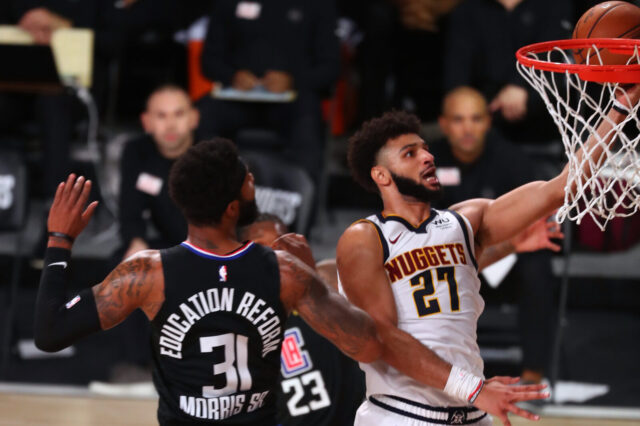As the Denver Nuggets have begun trending back in the right direction as a franchise, one of the ways they have improved is by becoming a better rebounding team. I detailed the importance of defensive rebounding before the season, even hypothesizing that the Nuggets may regress this year as a rebounding team but improve in defensive rating due to the addition of Paul Millsap. Both points have been marginally true, but as the season has worn on, the rebounding numbers have worsened.
| Date | Defensive Rebound % | Defensive Rebound League Rank |
|---|---|---|
| Pre February 1 | 78.6% | 8th |
| Post February 1 | 75.9% | 26th |
Yes, the Nuggets have officially gone from an elite rebounding team to a bottom five rebounding team on the defensive end since February 1st.
What’s interesting is that the number hasn’t changed nearly as drastically on the offensive end. Given the same shift in time period, the Nuggets have jumped from the second best offensive rebounding team (26.6%) to the 11th best (23.3%). Nine spots is a large jump, but not nearly as large as the 18 spots lost in defensive rebounding after February.
When looking at Denver’s individual players on the rebounding end, most players have had marginal increases or decreases in defensive rebounding rate, but one player who stands out, and not in a good way, is Mason Plumlee.
This content is no longer available.
Plumlee has been trusted to anchor most of Denver’s lineups without Nikola Jokic this season. Offensively, that has been more or less a failure after signing a massive contract in the offseason. What has been extremely frustrating to watch is Plumlee trying to corral rebounds on the defensive end.
Plumlee suffered a calf strain during a game against the Boston Celtics on January 29th, which caused him to miss a string of games to open up February. He also dealt with a core strain during the early and middle portion of the season, so him struggling to pull down defensive rebounds isn’t surprising, but the Nuggets have struggled regardless.
Instead of looking at rebounding individually, viewing it from a team rebounding perspective provides a better picture. Here are the numbers (after February 1st) for the team’s defensive rebounding percentage when each player is on the floor.
This content is no longer available.
While Plumlee has been a major contributor to defensive rebounding issues of late, it’s not limited to just him. The normal bench lineup that the Nuggets utilize features Plumlee, Will Barton, Devin Harris, and Trey Lyles in some capacity. Sometimes, Lyles will give way to Jokic in certain rotations and staggering, but those four have been the key bench pieces for some time. Only Lyles’ minutes feature an improvement in defensive rebounding, which is no surprise, given his 24.1 DREB% pre and post February 1st.
For context, the worst defensive rebounding percentage in the league belongs to the Orlando Magic. Their 75.4 team DREB% would rank higher than each of the posted marks when Plumlee, Barton, and Devin Harris each step on the floor.
Put all three of those guys on the floor, and the team DREB% drops to a ghastly 69.6.
It’s no surprise that when you put a poor defensive rebounder (Harris) next to a rebounder that can lack focus at times (Barton) the rebounding struggles a bit. The Nuggets are relying on Plumlee heavily to compensate for those two when he’s on the floor, and if Plumlee isn’t at full strength, it’s a perfect storm for disaster.
One of Denver’s largest weaknesses, both short term and long term, is their size and physicality on the perimeter. Denver’s guards are all 6’4 and shorter, except for Will Barton who’s rail thin. Adding Torrey Craig to the mix and having him play on the wing at a stout 6’6 has improved Denver’s rebounding considerably, and the numbers bear that out. The top five defensive rebounding teams in the NBA are the Charlotte Hornets, the Chicago Bulls, the Houston Rockets, the Utah Jazz, and the Portland Trail Blazers. Each of those teams has aggressive wings and forwards that crash the glass with reckless abandon. Neither of Denver’s starting guards provide that, and most of the responsibility falls on Nikola Jokic to be an elite rebounder.
To this point, Jokic has provided that. 16 rebounds and 15 defensive rebounds last night bears that out. But he’s not a top five rebounder in the NBA. He’s not pulling down that number of rebounds on average, and asking him to do so will shave years off of his NBA career.
The Nuggets must become more aggressive on the glass for the final six games of this NBA season and in seasons beyond. Given their likely defensive struggles due a suboptimal defensive core, finishing possessions as often as possible with a defensive rebound will help Denver improve on the margins.
If they cannot find the energy to focus on defensive rebounding, they may never reach the playoffs, let alone reach their ceiling as a team.


